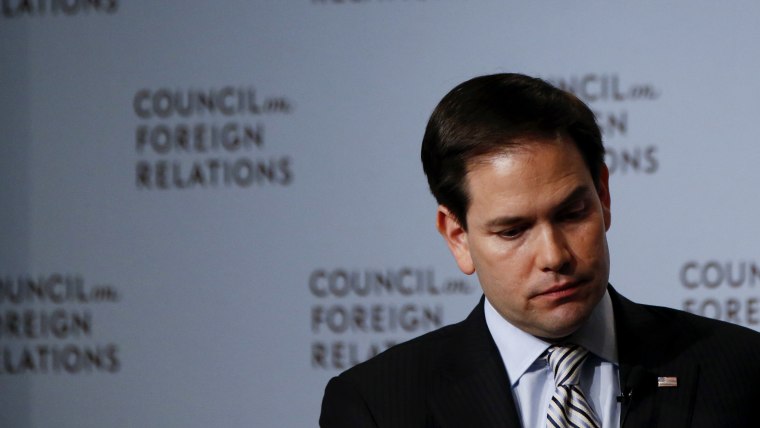Hillary Clinton took a tough-but-fair shot at the Republican presidential contenders this week, saying that when it comes to immigration, they "range across a spectrum of being either grudgingly welcome or hostile towards immigrants." Bloomberg Politics
reports that Marco Rubio didn't care for the comments.
"That's silly talk," Rubio, a son of Cuban immigrants, told a small group of reporters in Iowa on Wednesday after speaking at the Cedar Rapids Country Club during a campaign stop.... The Florida senator said he disagreed with Clinton's claim. "We have a right to enforce our immigration laws. That's not hostility, that's sovereignty," he said. He reiterated his support for overhauling U.S. immigration policy, including a pathway to permanent residency (a prerequisite to citizenship), but insisted that it "isn't going to happen until we do border security and bring illegal immigration under control. ... That's just a political reality."
It's really not. The political reality is that, in just the last Congress, there was a bipartisan, comprehensive immigration reform package. As Rubio knows -- he helped write it -- the reform bill enjoyed support from Democrats, Republicans, the private sector, labor unions, law enforcement, the faith community, and immigrant advocates. It easily passed the Senate and, by most accounts, had the votes it needed to pass the House.
To say that the political reality made that reform bill unpalatable is simply at odds with what actually happened.
As for Rubio's contention that policymakers must first focus on getting illegal immigration "under control," it's also worth noting that, thanks to the Obama administration's border-security efforts, illegal immigration flows "
have fallen to their lowest level in at least two decades," and the total population of undocumented immigrants has shrunk by roughly 1 million people in the Obama era.
The GOP presidential candidate uses the phrase "until we do border security" as if it hasn't already happened.
It has.
All of this comes against a complex backdrop. Rubio thought he'd make immigration reform his signature issue, right up until the right hated his bill, at which point he walked away from his own plan. The Florida senator desperately wants to impress conservatives who have a needlessly broad definition of "amnesty" (which means Rubio must oppose the very ideas he used to champion) while at the same time he wants to appeal to minority communities he'd need in a general election (which means Rubio can't sound like Donald Trump, Steve King, or most GOP lawmakers on Capitol Hill).
The result is a striking situation in which Rubio no longer feels comfortable talking about the issue he planned to ride into the White House. The
Boston Globe had a
fascinating report on this a couple of weeks ago.
During 2013, he mentioned "immigration" or "immigrant" 135 times on the Senate floor. But over the last two years, he's only uttered those words two times, according to a Globe review of the Congressional Record. Over those first six months of 2013, his office sent out nearly 150 press releases on immigration. Since then, he has issued just three press releases on the subject. And on the campaign trail, the subject rarely comes up unprompted. The story of Rubio's shift not only reveals an especially bald political calculation, but also reflects broader Republican ambivalence on an issue that continues to bedevil the party. His Cuban-American heritage, his family story, and his leadership on immigration made Rubio one of the GOP's most promising political figures to appeal to a growing and influential Hispanic demographic that is increasingly key to the national electoral success. But now that he seeks the favor of conservative primary voters, Rubio has transformed his calling-card issue into something else -- a question mark in his presidential resume.
When pressed, especially by the left, Rubio routinely argues (a) he didn't flip-flop on immigration; and (b) that he's
done more on the issue than Hillary Clinton.
The former claim has
struggled badly under scrutiny, and the latter is plagued by a fatal flaw. Clinton supported the same comprehensive solution Rubio used to support -- the difference is, Clinton hasn't changed her mind.
